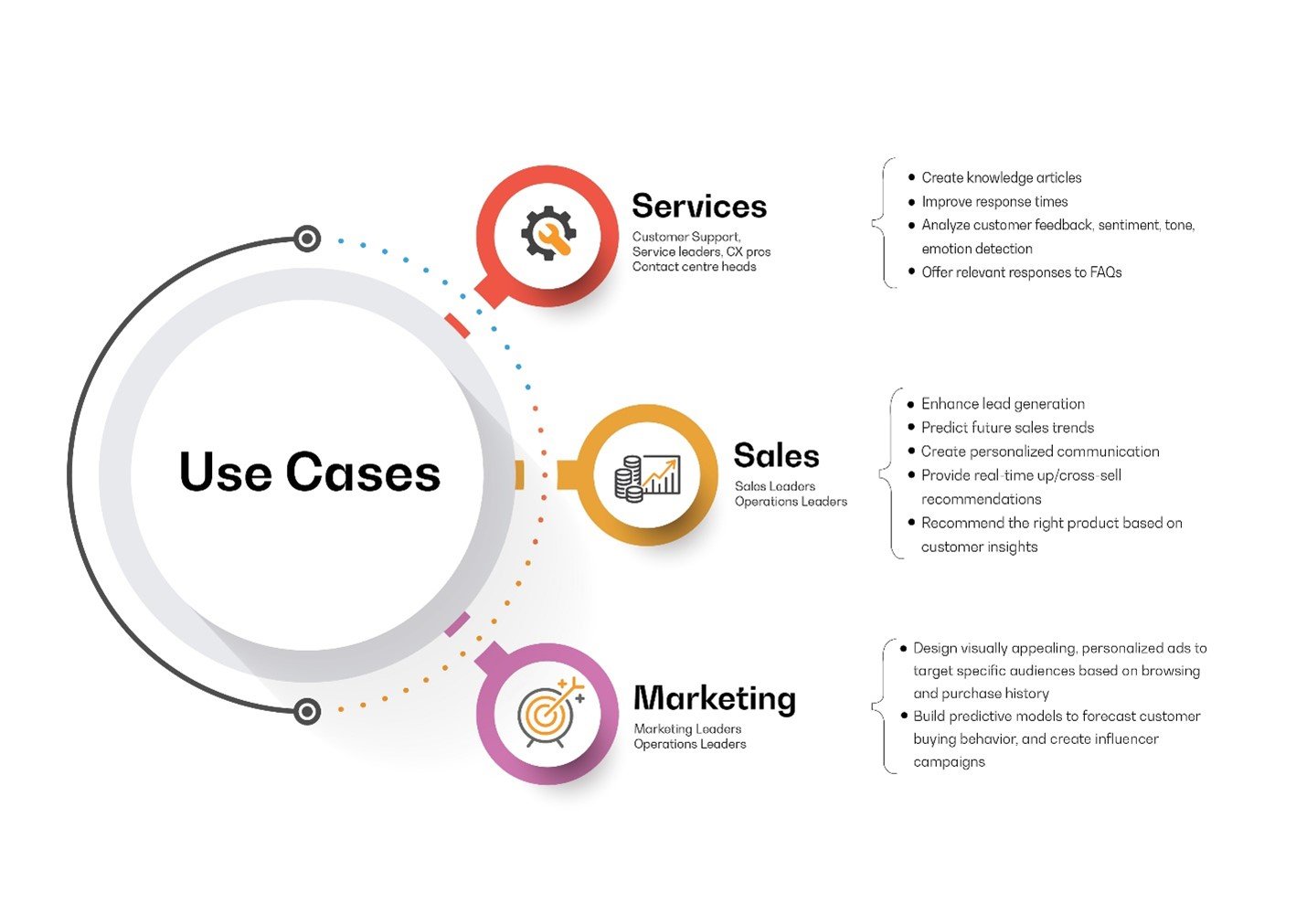
By Dheeraj Rawat & Amit Derkar
Revolutionizing your Customer Relationship Management through the integration of GPT with Salesforce.
In today’s hyper-competitive business landscape, delivering exceptional customer experiences is crucial for companies to stay ahead in the game. As technology continues to advance, artificial intelligence (AI) has emerged as a powerful tool for enhancing customer interactions. One such combination that holds immense potential is the integration of GPT with Salesforce. With Einstein GPT, Salesforce will transform every customer experience with generative AI.
Generative AI is poised to reshape CRM across departments in the years to come. It promises to help companies quickly and easily generate AI-created content across sales, services, marketing, commerce, and IT interactions.
GPT or Generative Pre-trained Transformers is an advanced natural language processing (NLP) model. It utilizes deep learning techniques to generate human-like text, images, and sounds and answer questions in a conversational manner. This is one of the reasons it is called Generative AI. GPT’s Large Language Models (LLMs) have been trained on vast amounts of data and can understand context, generate coherent and relevant responses, and even simulate human-like conversations.
Investing in Generative AI
Business leaders are prioritizing generative AI-related investments but are wary of risks.
According to recent Salesforce research, most senior IT leaders (84%) say generative AI will help their organization better serve customers. And with 67% of these leaders prioritizing generative AI for their business within the next 18 months and with one-third (33%) claiming it as a top priority. As a result, there is an urgent need to ensure the new technology is deployed effectively.
Many business leaders want to embrace generative AI, but are wary of the risks – privacy, bias, and siloed data governance concerns are creating a trust gap. According to Salesforce research, 73% of employees believe that generative AI introduces new security risks and nearly 60% of those who plan to use the technology don’t know how to keep data secure. As a result, 65% of senior IT leaders can’t justify the implementation of generative AI at the moment.
Delivering Superior Experiences
Generative AI will reshape CRM To deliver superior experiences to customers and employees. Generative CRM combines the power of generative AI with your customer data to enhance customer relationships, productivity, and efficiency. Generative CRM can be used in Services, Sales and Marketing functions helping them reduce time on mundane repetitive tasks that can be automated, and free up employees to focus on high value work.
Right click on image to view in separate tab.
As Generative AI has the potential benefits and is poised to be the “game changer” and a “disruptor” in the CRM space, Salesforce is embedding Generative AI capabilities across every Salesforce application. Salesforce, having been working on AI tools and embedding them right within its products – AI Cloud with Einstein GPT Trust Layer, Einstein Prediction, Next Best Action, etc. Salesforce has extended its AI offerings with Einstein GPT. And the cherry on top is that Einstein GPT is open,extensible and supports public and private AI models. It already has integrations available with ChatGPT.
Salesforce is bringing trusted generative AI to every product with Sales GPT, Service GPT, Marketing GPT, Commerce GPT, Slack GPT, Tableau GPT, Flow GPT, and Apex GPT.
Unlocking Business Value
Use Salesforce’s generative AI capabilities to unlock business value.GPT’s natural language processing capabilities make it an ideal candidate for enhancing customer interactions. By using GPT with Salesforce, businesses can unlock a range of benefits that enhance customer engagement, improve operational efficiency and productivity of employees or agents. Here are a few key areas where GPT can make a significant impact:
| Objectives | Capabilities | Description | |
| Customer Engagement Improvement | Efficient Data Analysis | GPT can analyze large volumes of customer data stored in Salesforce, providing valuable customer insights on behavior, preferences, and trends. This enables businesses to make data-driven decisions, improve marketing strategies, and enhance customer segmentation. | |
| Sentiment Analysis | GPT can analyze the sentiment of customer interactions, such as emails or chat conversations, and provide insights into customer satisfaction levels with conversation summarization. This helps in understanding the customer better & resolve queries proactively. | ||
| Intelligent Chatbots | Using GPT with Salesforce’s chatbot capabilities will enable businesses to provide customers with 24*7 support. GPT-powered chatbots can understand complex queries, engage in natural conversations, and provide prompt resolutions, improving customer satisfaction. | ||
| Productivity Improvement | Automated Responses | GPT can understand customer inquiries and provide automated responses or suggestions to common questions or issues. This can help customers get immediate assistance on self-service portals while reducing the workload for support agents. | |
| Omni Channel Support | With GPT, skill-based routing and omni channel support can be enhanced. GPT can help identify, aggregate, and classify cases. GPT can share relevant knowledge articles with customers automatically and route cases to required agents more effectively. This saves time and ensures that each case is handled by the most suitable agent. | ||
| Knowledge Base Recommendations | By leveraging Salesforce’s knowledge base, GPT can suggest relevant knowledge articles or solutions to support agents based on the customer’s inquiry. GPT can also automatically create new knowledge articles based on cases and resolutions. This speeds up case resolution and ensures consistent responses. | ||
| Efficiency Improvement | Streamlining Workflows | GPT’s ability to understand and generate natural language can streamline various internal workflows within Salesforce. For example, use GPT to automate data entry tasks, saving time for sales and service professionals.
By analyzing historical data, GPT can identify trends and patterns, allowing businesses to make data-driven decisions. GPT can assist in generating reports, proposals, and other documentation, reducing manual effort, and improving productivity. |
|
Beginning the Journey
Revolutionizing the Salesforce CRM with Generative AI is a long transformation journey.
The integration of GPT with Salesforce is just the beginning of a transformative journey. As AI technology advances, we can expect even more sophisticated applications and capabilities. From voice recognition to sentiment analysis, GPT can continue to evolve and enhance customer engagement in Salesforce, enabling businesses to deliver exceptional experiences.
One of the most significant advantages of GPT is its ability to learn, improve, and retain learnings. By leveraging their customer data in Salesforce, businesses can continuously train GPT models with their proprietary data. This iterative learning process ensures that the generated responses and recommendations align with the company’s specific needs and industry domain. The more the model learns from actual customer interactions, the better it becomes at understanding and assisting customers.
Integrating GPT with Salesforce opens up a world of possibilities for businesses aiming to enhance their sales, customer support, and overall operational efficiency. By leveraging GPT’s language processing capabilities and Salesforce’s robust CRM platform, organizations can streamline workflows, improve customer interactions, and drive revenue growth. As the field of NLP continues to evolve, we can expect even more exciting applications and synergies between GPT and Salesforce, revolutionizing the way businesses engage with their customers.
So, What Next?
Identifying the top-most Generative AI Use Cases that deliver early success is a vital step. Organizations need to identify the right use cases of Generative AI in the customer engagement domain where they can use Salesforce capabilities and features. The use case can bring true competitive advantage and create the largest impact relative to existing solutions. Once the right use case is identified, they will need to work with their technology teams responsible for the Salesforce ecosystem to define the feasibility, roadmap of leveraging Generative AI capabilities of Salesforce.
Why Movate?
With Movate’s 18+ years of experience in delivering memorable customer experience using Salesforce and our dedicated focus and investments in building Generative AI capabilities and services for our clients. We are helping enterprises set up a Generative AI Co-innovation Lab to accelerate the adoption of Generative AI across the enterprise. Our Salesforce experts and domain consultants can help you with ideation and consulting, use case development and co-engineering and delivery of Salesforce Einstein GPT—Salesforce’s generative AI for CRM. Our focus is on helping clients identify innovative use cases for Sales and Service to start with. With this as the initial starting point, sales and service use cases will showcase generative AI’s benefits and potential return on investment.
Contact us for Salesforce consulting or more information on generative AI.
Additional Information
- Web: Movate Gen AI services
- Web: Salesforce & Movate partnership
- Blog: Modernize legacy CRM systems using salesforce to accelerate value realization
- Flyer: Assess your Salesforce Service Cloud maturity
- Flyer: Optimize your Salesforce ecosystem
Authors


